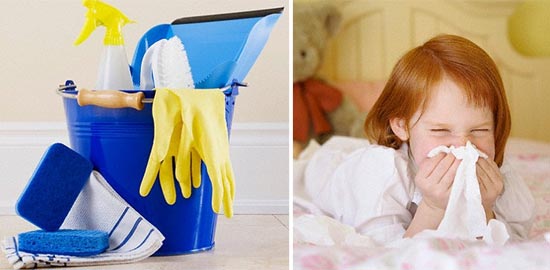The house is too clean to make children easily sick
Many parents generously use detergent-containing products, hoping they will blow away pathogenic bacteria, making the house shiny. Although this habit actually helps kill microorganisms, it can also make children more susceptible to influenza, tonsillitis or other infections, according to a new study.
The house is too clean to make children easily sick
Researchers have found an association between regular use of household detergents and the incidence of inflammatory diseases , especially respiratory infections in young children. They concluded that passive exposure to bleach was associated with a 35% increase in the risk of relapse of tonsillitis and 20% of the risk of childhood flu last year.
Experts emphasize that the use of bleach in households is therefore "a concern for public health".
The conclusion was drawn after researchers looked at the potential impact of detergent exposure on more than 9,000 students between the ages of 6 and 12 in Finland, the Netherlands and Spain.

In the study, parents were asked to fill out a survey about the number of times as well as the frequency of their children with influenza, tonsillitis, sinusitis, bronchitis, otitis and pneumonia in the last 12 months. . They were also asked whether to use bleach to clean the house at least once a week.
The use of chemical detergents is relatively common in Spain (72%), but quite rare in Finland (7%). In particular, all Spanish schools are cleaned with bleach, while Finnish schools do not.
Researchers have taken into account factors such as passive smoking (inhaling smoke from the air, but not directly smoking cigarettes or waterpipe tobacco) at home, parenting education, mold in households. and the use of cleaners at school.
Results revealed, in all three countries in the study, the number and frequency of infections of the above-mentioned infections among children whose parents frequently used higher cleaning detergents. In particular, in addition to the significantly higher risk of influenza and tonsillitis, the risk of recurring any infectious disease in children whose parents "prefer " detergents is also higher than the remaining children by 18%.
A possible explanation for the above situation is that the stimulating properties of detergents produced during the cleaning process can destroy the walls of lung cells, triggering inflammation, suppressing the immune system. Translation of young children and makes infection easier to develop.
Dr. Lidia Casas of the Center for Environment and Health in Belgium, the head of the study, stressed, the discovery is very worrying. According to her, the abuse of disinfection products stems from misconceptions and hype about the house " shiny, clean, no germs".
- Thinking you sick will make you sick
- Why are children and elderly people prone to getting sick?
- Why does autumn make you sick?
- The smart home knows that the owner is sick
- Why do young children often get sick?
- The house was hidden, as it appeared in a fictional film that was in real life
- Robots help sick children 'connect' to the classroom
- Build floating house to clean garbage on the sea
- Clean water affects the height of children
- Children breathe more easily in the countryside
- UFO house floating in the ocean
- 7 important principles in body hygiene
 Green tea cleans teeth better than mouthwash?
Green tea cleans teeth better than mouthwash? Death kiss: This is why you should not let anyone kiss your baby's lips
Death kiss: This is why you should not let anyone kiss your baby's lips What is salmonellosis?
What is salmonellosis? Caution should be exercised when using aloe vera through eating and drinking
Caution should be exercised when using aloe vera through eating and drinking